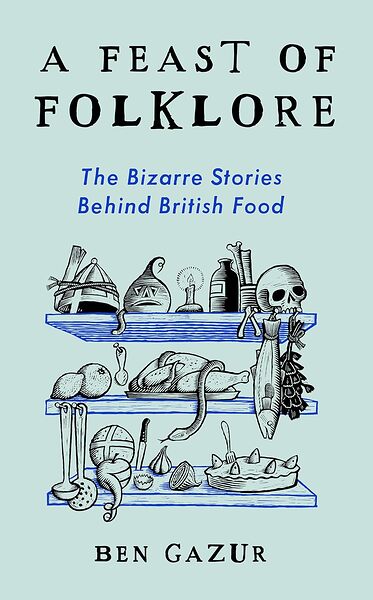Looking for a good read? Here is a recommendation. I have an unusual approach to reviewing books. I review books I feel merit a review. Each review is an opportunity to recommend a book. If I do not think a book is worth reading, I find another book to review. You do not have to agree with everything every author has written (I do not), but the fiction I review is entertaining (and often thought-provoking) and the non-fiction contain ideas worth reading.
Book Review
Food and English Folklore
Reviewed by Mark Lardas
January 5, 2025
“A Feast of Folklore: The Bizarre Stories Behind British Food,” by Ben Gazur, Unbound, November 2024, 256 pages, $22.95 (Hardcover), $11.99 (E-book)
Food is essential to human survival. It occupies a central portion of our daily lives. In years past its production, from seed to table was formed the labor of most of society. It is to be expected it fills an equally central part of our folklore and culture.
“A Feast of Folklore: The Bizarre Stories Behind British Food,” by Ben Gazur, collects stories, superstitions, and traditions about food and its folkways. It takes readers on a visit to virtually all corners of cuisine.
The book is encyclopedic. Gazur covers everything, from soup to nuts, seasonings to main course. There are chapters on vegetable, fruit, fish, dairy, bread, and drink lore. Pies and cakes get their own chapters as do love magic associated with food and fairy food. The final chapter examines customs associated with free food and food doles.
Its focus is Great Britain, primarily England, Wales and Scotland. Some Irish food lore also appears as to occasional references to foreign traditions. Gazur also explores American food tradition brought over from Britain. The book is filled with curiosities and oddities. It also explains where customs and beliefs arose.
Why do we throw a pinch of salt over our left shoulder if we spill salt (or simply for luck)? Gazur links this to the ancient custom of providing guests with salt – spilled salt indicates a break in the guest-host relationship, which must be appeased. Throwing salt over the left should drives away evil spirits who come to take advantage of the opportunity. They always approach from sinister (left). However Gazur concludes his explanation should be taken with a pinch of salt, as folklore origins are rarely straightforward.
This opening tale is typical of the anecdotes filling this book. Some of the explanations are necessarily vague. A few beliefs prove to be remarkably modern. The belief that carrots promote good night vision dates to World War II. To conceal they were using airborne radar to hunt Nazi bombers in night raids, the War Ministry spread the tale they were feeding their fighter pilots carrots to help them see in the dark. A new fallacy was born.
“A Feast of Folklore” is filled with similar anecdotes, from potatoes being a considered a cure for rheumatism to cake rolls and bun tosses associated with different holidays and events. It covers many curious customs and traditions in a lively account of food’s interaction with human society.
Mark Lardas, an engineer, freelance writer, historian, and model-maker, lives in League City. His website is marklardas.com.
